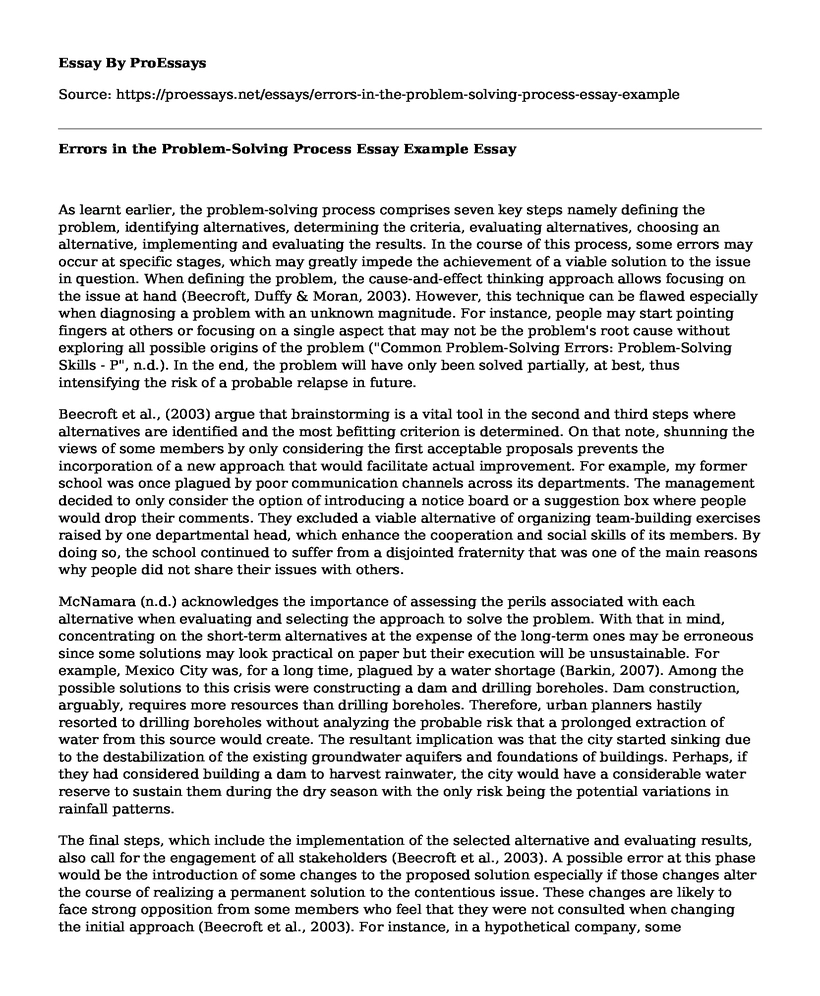As learnt earlier, the problem-solving process comprises seven key steps namely defining the problem, identifying alternatives, determining the criteria, evaluating alternatives, choosing an alternative, implementing and evaluating the results. In the course of this process, some errors may occur at specific stages, which may greatly impede the achievement of a viable solution to the issue in question. When defining the problem, the cause-and-effect thinking approach allows focusing on the issue at hand (Beecroft, Duffy & Moran, 2003). However, this technique can be flawed especially when diagnosing a problem with an unknown magnitude. For instance, people may start pointing fingers at others or focusing on a single aspect that may not be the problem's root cause without exploring all possible origins of the problem ("Common Problem-Solving Errors: Problem-Solving Skills - P", n.d.). In the end, the problem will have only been solved partially, at best, thus intensifying the risk of a probable relapse in future.
Beecroft et al., (2003) argue that brainstorming is a vital tool in the second and third steps where alternatives are identified and the most befitting criterion is determined. On that note, shunning the views of some members by only considering the first acceptable proposals prevents the incorporation of a new approach that would facilitate actual improvement. For example, my former school was once plagued by poor communication channels across its departments. The management decided to only consider the option of introducing a notice board or a suggestion box where people would drop their comments. They excluded a viable alternative of organizing team-building exercises raised by one departmental head, which enhance the cooperation and social skills of its members. By doing so, the school continued to suffer from a disjointed fraternity that was one of the main reasons why people did not share their issues with others.
McNamara (n.d.) acknowledges the importance of assessing the perils associated with each alternative when evaluating and selecting the approach to solve the problem. With that in mind, concentrating on the short-term alternatives at the expense of the long-term ones may be erroneous since some solutions may look practical on paper but their execution will be unsustainable. For example, Mexico City was, for a long time, plagued by a water shortage (Barkin, 2007). Among the possible solutions to this crisis were constructing a dam and drilling boreholes. Dam construction, arguably, requires more resources than drilling boreholes. Therefore, urban planners hastily resorted to drilling boreholes without analyzing the probable risk that a prolonged extraction of water from this source would create. The resultant implication was that the city started sinking due to the destabilization of the existing groundwater aquifers and foundations of buildings. Perhaps, if they had considered building a dam to harvest rainwater, the city would have a considerable water reserve to sustain them during the dry season with the only risk being the potential variations in rainfall patterns.
The final steps, which include the implementation of the selected alternative and evaluating results, also call for the engagement of all stakeholders (Beecroft et al., 2003). A possible error at this phase would be the introduction of some changes to the proposed solution especially if those changes alter the course of realizing a permanent solution to the contentious issue. These changes are likely to face strong opposition from some members who feel that they were not consulted when changing the initial approach (Beecroft et al., 2003). For instance, in a hypothetical company, some disgruntled employees who had agreed with their bosses to increase their wages by 30% to cater for their financial shortfalls may feel much aggrieved if the employer decides to slash this pay-rise to 25%. The ensuing effect is that these employees will still complain about the poor remuneration that was, perhaps, the root cause of their discontentment.
References
Barkin, D. (2007). Mexico City's Water Crisis. Retrieved from https://nacla.org/article/mexico-citys-water-crisis
Beecroft, G. D., Duffy, G. L., & Moran, J. W. (2003). The executive guide to improvement and change. ASQ Quality Press.Common Problem-Solving Errors: Problem-Solving Skills - P. Retrieved from https://miamioh.instructure.com/courses/62208/pages/common-problem-solving-errors
McNamara, C. (n.d.). Problem Solving and Decision Making (Solving Problems and Making Decisions). Retrieved from https://managementhelp.org/personalproductivity/problem-solving.htm
Cite this page
Errors in the Problem-Solving Process Essay Example. (2022, Aug 23). Retrieved from https://proessays.net/essays/errors-in-the-problem-solving-process-essay-example
If you are the original author of this essay and no longer wish to have it published on the ProEssays website, please click below to request its removal:
- Types of Project Delays
- Competitor Service Area Analysis
- Paper Example on Personality in Relation to Leadership Behavior
- Banking Retail Product Development or Customer Satisfaction, Effect of Management Decision
- How to Apply Motivation, Leadership Skills in Workplace Essay Example
- Paper Example on Maximizing Performance in Healthcare: Why Project Portfolio Management Matters
- Essay Sample on Successful Leadership Techniques for Business Management







